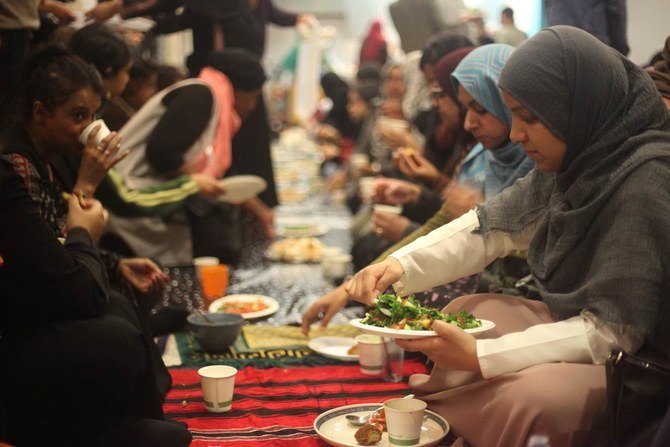Tech platforms build community spirit during Ramadan

https://arab.news/g6b6g
Even though the worst of the pandemic appears to be over, British Muslims will still approach this year’s Ramadan differently. After all, the world is hardly the same.
Not far from my home in London, a frightening war between Russia and Ukraine is unfolding on Europe’s eastern border, triggering a surge of millions of refugees. And while COVID-19 blindsided global economies, the escalating energy and food crisis — exacerbated by the war — has made life harder for over 80 percent of British adults, according to the UK’s Office for National Statistics last month.
The harm to an entire generation, and an entire nation, are undeniably visible, which makes celebrating Ramadan understandably difficult.
But if we learned anything during the days of squinting at virtual YouTube sermons, it was that the immense power of human ingenuity and creativity — as well as the power of faith — can help navigate difficult times.
Many studies show that we are psychologically and biologically primed to connect with religion during a crisis. But when our normal outlets for faith were closed during the pandemic, we were forced to look elsewhere for religious access — an obstacle that led us to increasingly engage with technology.
Before the pandemic, tech had already been playing an increasingly transformative role in religious life — just consider how some platforms transformed Zakat and charitable giving — but as the 2020 lockdowns began it was clear much more needed to be done. Tech entrepreneurs were quick to respond, constructing virtual reality headsets and apps, which helped us meet our spiritual commitments in ways we never could have imagined.
Other apps bring many Islamic religious service providers together onto a single platform, providing services ranging from marriage counseling to Qur’an lessons — helping Muslims connect with their faith and each other at the touch of a button.
Instead of seeing technological change as a negative disruption, I see it as a positive opportunity, which doesn’t have to come at the expense of our faith. And I know I’m not alone.
Young Muslims in particular are using faith-based tech to create safe online spaces to discuss issues they feel are taboo, or are traditionally ignored. For example, the UK charity Muslim Youth Helpline claim that more than half of young British Muslims suffer from anxiety and depression — before the beginning of the health crisis. But mental health is often a sidelined topic in Muslim households, a sad reality that has made online spaces even more crucial over the past two years.
Young Muslims can also use apps to hold stigmatized conversations on mental health, women’s empowerment, Muslim identity, and even climate action.
Tech has given young Muslims a voice, and they will not be silent from now on.
However, the digitalization of our faith is doing more than changing how we practice Islam. It also ensures that British Muslims have a louder public voice. After all, tech has the power to connect us, meaning that the bridge between Muslims and non-Muslims is strengthening alongside a booming online Muslim presence. In the UK this means that Muslim identity is being addressed in groundbreaking ways.
For example, service industries in London are catering to a diverse halal food and lifestyle scene, while pop culture has been overrun by Muslim cultural reference points — such as the new British TV series ‘We Are Lady Parts,’ or actor and rapper Riz Ahmed’s album ‘The Long Goodbye.’
The result is that Ramadan in 2022 doesn’t look much like recent Ramadans. But neither does it look exactly like the Ramadan my parents knew and loved.
There are still real problems in the world — from income inequality to climate change, a burgeoning refugee crisis, and conflict on the European continent.
I know that tech cannot solve all of these problems. But it can provide us with valuable tools which help us connect to the beliefs, values, and the communities that give us the desire, and the will, to try our best.
• Muddassar Ahmed is an advisory council member at the Atlantic Council in Washington.









































